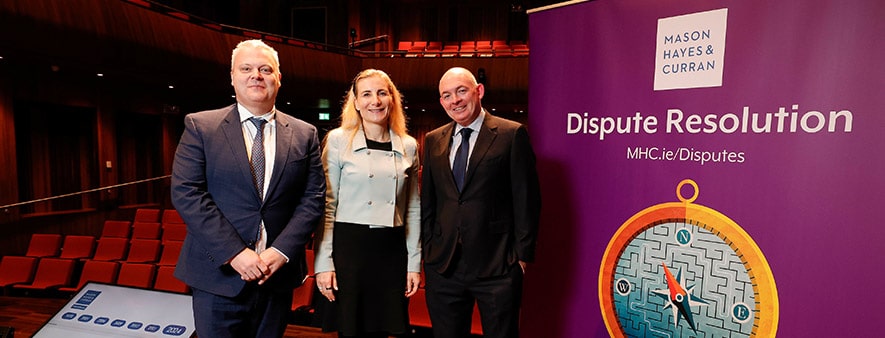 (L-R): Gerard Kelly, panellist Anneliese Day KC, and Attorney General Rossa Fanning SC
(L-R): Gerard Kelly, panellist Anneliese Day KC, and Attorney General Rossa Fanning SC
Lack of awareness an ADR barrier – survey
A survey of legal professionals carried out by business-law firm Mason Hayes & Curran (MHC) has found that six out of ten believe that mediation is the most effective method of alternative dispute resolution (ADR).
Just over half of respondents, however, said that lack of awareness was the biggest barrier to the broader adoption of ADR methods, which also include arbitration and negotiation.
ADR offers parties ways to resolve disputes outside of traditional court proceedings, often resulting in faster, more cost-effective, and less adversarial outcomes.
Mediation preferred
MHC conducted the survey of 200 professionals at its recent conference on dispute resolution in Dublin.
Almost half of respondents pointed to agreeing on ADR mechanisms as the biggest challenge in negotiating dispute-resolution clauses in commercial contracts.
MHC says that, while mediation is often preferred for collaboration, negotiation can allow for faster settlements and arbitration offers a more formal, binding resolution.
Only 4% of legal professionals, however, chose arbitration as the most effective ADR method.
Education and promotion
“Companies need to take account of the type of dispute-resolution mechanism that will best serve them, no matter what side of the dispute they are on,” said Gerard Kelly (MHC partner in dispute resolution).
“They should consider whether they want something that is cost-effective or speedy, and whether it is important to maintain a business relationship while a dispute is being resolved.”
Kelly added that the survey’s findings on awareness of ADR underscored the potential need for greater education and promotion of ADR methods.
“The legal profession can work to shift the perception that ADR is too expensive or too complicated,” he stated.
Attorney General Rossa Fanning SC delivered a keynote address on Ireland’s advantages as a place to do business and resolve disputes effectively.
He described Ireland as “a jurisdiction that takes the resolution of disputes outside of court seriously – and rightly so.”
Class actions
The survey also covered the introduction of a form of class actions for consumers in Ireland.
While 47% of respondents viewed collective actions for consumers as “necessary and overdue”, 49% saw them as “beneficial but risky”.
The Representative Actions for the Protection of the Collective Interests of Consumers Act 2023 commenced in April this year, and provides a mechanism for consumers to take collective legal action.
MHC says, however, that there is ongoing uncertainty about the funding of these actions, with consumers paying €25 to participate.
“One of the main challenges is the prohibition of litigation funding. There will need to be a workable funding mechanism to facilitate the bringing of collective actions to ensure the act fulfils its purpose,” said Peter Johnston (MHC dispute-resolution partner).
Gazette Desk
Gazette.ie is the daily legal news site of the Law Society of Ireland